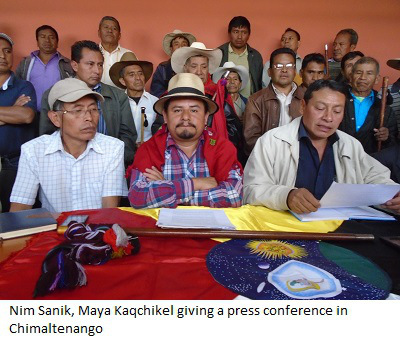by Christin Sandberg
IC Magazine
On Sept. 4, after ten days of widespread street protests against the biotech giant Monsanto’s expansion into Guatemalan territory, groups of indigenous people joined by social movements, trade unions and farmer and women’s organizations won a victory when congress finally repealed the legislation that had been approved in June.
The demonstrations were concentrated outside the Congress and Constitutional Court in Guatemala City during more than a week, and coincided with several Mayan communities and organizations defending food sovereignty through court injunctions in order to stop the Congress and the President, Otto Pérez Molina, from letting the new law on protection of plant varieties, known as the “Monsanto Law”, take effect.
On Sept. 2, the Mayan communities of Sololá, a mountainous region 125 kilometers west from the capital, took to the streets and blocked several main roads. At this time a list of how individual congressmen had voted on the approval of the legislation in June was circulating.
When Congress convened on Sept. 4, Mayan people were waiting outside for a response in favor of their movement, demanding a complete cancellation of the law –something very rarely seen in Guatemala. But this time they proved not to have marched in vain. After some battles between the presidential Patriotic Party (PP) and the Renewed Democratic Liberty Party (LIDER), the Congress finally decided not to review the legislation, but cancel it.
Lolita Chávez from the Mayan People’s Council summarized the essence of what has been at stake these last weeks of peaceful protests as follows: “Corn taught us Mayan people about community life and its diversity, because when one cultivates corn one realizes that there is a variety of crops such as herbs and medical plants depending on the corn plant as well. We see that in this coexistence the corn is not selfish, the corn shows us how to resist and how to relate with the surrounding world.”
Controversies surrounded law
The Monsanto Law would have given exclusivity on patented seeds to a handful of transnational companies. Mayan people and social organizations claimed that the new law violated the Constitution and the Mayan people’s right to traditional cultivation of their land in their ancestral territories.
Antonio González from the National Network in Defense of Food Sovereignty and Biodiversity commented in a press conference Aug. 21: “This law is an attack on a traditional Mayan cultivation system which is based on the corn plant but which also includes black beans and herbs; these foods are a substantial part of the staple diet of rural people.”
The new legislation would have opened up the market for genetically modified seeds which would have threatened to displace natural seeds and end their diversity. It would have created an imbalance between transnational companies and local producers in Guatemala where about 70 per cent of the population dedicate their life to small-scale agricultural activities. That is a serious threat in a country where many people live below the poverty line and in extreme poverty and where children suffer from chronic malnutrition and often starve to death.
The law was approved in June without prior discussion, information and participation from the most affected. It was a direct consequence of the free trade agreement with the US, ratified in 2005. However, recently the protests started to grow and peaked a couple of weeks ago with a lot of discussions, statements and demonstrations.
At first the government ignored the protests and appeared to be more interested in engaging in superficial forms of charity like provision of food aid while ignoring the wider and structural factors that cause and perpetuate poverty in Guatemala such as unequal land distribution, deep rooted inequalities, racism, to name but a few.
But soon enough they decided to act. Even though politicians claimed not to act on social demands, it is without doubt a decision taken after enormous pressure from different social groups in society.
Criminalizing the Mayan people – again
There was a great risk that the Monsanto Law would have made criminals of already repressed small farmers who are just trying to make ends meet and doing what they have done for generations – cultivating corn and black beans for their own consumption. The Monsanto Law meant that they would not have been able to grow and harvest anything that originates from natural seeds. Farmers would be breaking the laws if these natural seeds had been mixed with patented seeds from other crops as a result of pollination or wind, unless they had had a license for the patented seed from a transnational corporation like Monsanto.
Another risk expressed by ecologists was the fear that the costs for the patented seeds would have caused an increase in prices and as consequence caused a worsened food crisis for those families who could not afford to buy a license to sow.
Academics, together with the Mayan people, also feared that the law would have intensified already existing fierce social conflicts between local Mayan communities and transnational companies in a country historically and violently torn apart.
Mayan people and Mother Earth
Currently international companies are very interested in gaining control of the abundant and rich natural assets that Guatemala possesses.



